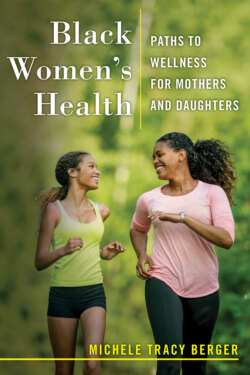Black Women's Health

Реклама. ООО «ЛитРес», ИНН: 7719571260.
Оглавление
Michele Tracy Berger. Black Women's Health
Black Women’s Health. Paths to Wellness for Mothers and Daughters
Contents
Introduction
Framing Questions and Goals of the Book
Why Mothers and Daughters
Making Black Women’s and Black Girls’ Health Visible: Academic and Popular Frames
Health Warrior and Icon: Michelle Obama’s Let’s Move Campaign
Black Women’s and Girls’ Health in Film and TV
Black Women’s and Girls’ Activism Intersecting with Health
Methods
Analysis
Organization of This Book. Chapter 1. Mother and Daughter Narratives about Health, Sexuality, and Young Womanhood
Chapter 2. Mothers’ Health Narratives
Chapter 3. “I’m in Between”: Daughters and Health Inheritances
Chapter 4. “I Want That First Kiss to Be Perfect”: Mothers on Intimacy, Pleasure, and Sexuality
Chapter 5. “Mom, Can We Talk about Sex?”: Daughters and Sexuality
Chapter 6. Resolutions
1. Mother and Daughter Narratives about Health, Sexuality, and Young Womanhood
African American Women’s and Girls’ Health in North Carolina
Mothers. The Experts
The Transitioners
The Revealers
The Nostalgics
The Strategists
Summary
Daughters. The Romantics. Corresponding Mothers’ Group: The Nostalgics
The Equalizers. Corresponding Mothers’ Group: The Experts
The Loners. Corresponding Mothers’ Group: The Revealers
The Moderates. Corresponding Mothers’ Group: The Strategists
The Distrusters. Corresponding Mothers’ Group: The Transitioners
Becoming a Young Woman
Respect
Pressure
Trust
Conclusion
2. Mothers’ Health Narratives
Defining Health
Mothering Practices and Inherited Health
Barriers to Health
We Just Give Ourselves Away
Diet and Exercise
Race, Gender, and the Health-Care Experience
Doctors
Perceptions of Daughters’ Health Risks and the Silence about HIV/AIDS
Conclusion
3 “I’m in Between” Daughters and Health Inheritances
Defining Health
Mindset
Cleanliness
Responsibility
Conversations with Mothers about Health
Barriers. Diet and Exercise
Perceptions of Mothers’ Health
Trust and Daughters’ Health
Health Providers and the Medical Encounter
Conclusion
4 “I Want That First Kiss to Be Perfect” Mothers on Intimacy, Pleasure, and Sexuality
Legacies “I’m Not Like My Mother, I Talk about Sex”
Talking about Intimacy
Communicative Strategies. I Put the Fear of God in Them
My Daughter’s Listening (to Me), But Is She Really Hearing Me?
Daughters’ Derailers: Pregnancy, Gendered Peer Pressure, and STDs
Keeping Her Safe: Babies as Deterrents and Brothers as Gatekeepers
Girls Today: Gendered Peer Pressure
STDs
Conclusion
5 “Mom, Can We Talk about Sex?” Daughters and Sexuality
Definitions and Perceptions
Communicating with Mothers
“I Learned It All on My Own”
“There Are So Many Things I Want to Know”
What Would You Tell Your Friend? Navigating “Good” Girl and “Bad” Girl Culture
Conclusion
6. Resolutions
Avoiding Mother Blame
Inheritances and Legacies
Future Directions
Acknowledgments
Appendix. Methodological Notes. Profile of Research Participants’ Characteristics
Collecting and Analyzing the Data. Recruitment
Focus Group Protocol
Notes. Introduction
Chapter 1. Mother and Daughter Narratives about Health, Sexuality, and Young Womanhood
Chapter 2. Mothers’ Health Narratives
Chapter 3. “I’m in Between”
Chapter 4. “I Want That First Kiss to Be Perfect”
Chapter 5. “Mom, Can We Talk About Sex?”
Chapter 6. Resolutions
appendix
Bibliography
Index
About the Author
Отрывок из книги
Michele Tracy Berger
NEW YORK UNIVERSITY PRESS
.....
She credited much of her initial interest in creating a healthy lifestyle to her goal of “cooking a good meal for my kids.”49 She stressed how challenged working parents are, especially mothers, in facing the daily dilemma of meal preparation and cooking. Her interest in community gardens, fresh foods, and creating healthy meals was relatable to every working woman and especially mothers. President Obama is not absent in her discussions of cooking and the maintenance of family health, but Michelle Obama’s role as a mother is centralized, which reinforces a gendered division of labor in the house and also in the domain of health.50 Despite this more traditional positioning of motherhood, her story resonated so deeply because it struck many as true to many women’s experiences.
In the past two decades, clinicians and public health scholars have warned the public about the obesity epidemic in the United States and globally.51 Others have been critical about the framing of obesity, the resulting representation of who is obese, and the preponderance of neoliberal approaches that focus on individual versus structural solutions.52 There were many ways Michelle Obama’s discussion of obesity left unaddressed the larger structural issues that also contribute to obesity, such as environmental pollution. However, Obama’s statements also push back against framing obesity solely as a moral panic and crisis. Moreover, her comments shift the hyperfocus on weight and stigma that can become instilled in young people in particular, and instead stress emotional development and self-confidence.53 Drawing on her experience raising her daughters, she presents a narrative less interested in policing the body. During interviews she repeatedly stated, “I never talked to them [her children] about weight in the household, we just started making changes . . . I just surrounded them with foods that were healthy and they could eat whatever they wanted . . . and just try to make activities fun.”54 In one interview, FLOTUS advised parents (and others) interested in modeling healthy behaviors for their kids to not “make this an issue about looks” but instead “talk to kids about how they feel inside.” She argued that by doing so, people can look beyond “the physical manifestations of the challenge, but we’re really tapping into what’s going on inside the head of that child.”55 While naming an important and factual health issue—that one in two Black and Latino kids are obese and they will be disproportionately affected by diabetes—she periodically rejected the pervasive language of moral crisis and stigma. On this issue, she asserted, “we don’t need someone to label it to know that we can fix it, we can change it.”56
.....